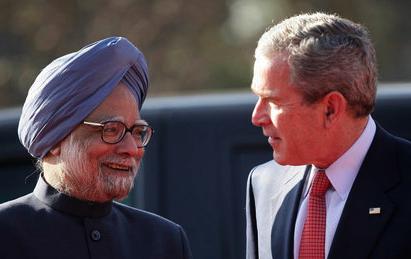This post by Rory Medcalf originally appeared on The Interpreter. I’ve a lot of respect for the work of the Arms Control Wonk, Jeffrey Lewis, whose blog consistently provides some of the world’s best in-depth news, speculation and background on arms control issues. But I think he has it wrong in his latest post on India and nuclear testing. Jeffrey intriguingly cites the discrepancies between two major statements by Indian Prime Minister Manmohan Singh, and makes much of the fact that the more recent of these, delivered at a 9 June disarmament conference in New Delhi, omitted reference to India’s […]
India Archive
Free Newsletter
Jeffrey Lewis of Arms Control Wonk reads the tea leaves and wonders whether India won’t try to use the 123 Agreement (if it’s ever approved) as license for a new round of nuclear weapons testing. There’s reason to believe that India’s last round of tests in 1998 did not include a successfully detonated hydrogen bomb. Lewis speculates that Indian PM Manmohan Singh might be under pressure to fill that technological gap. It’s hard to imagine exactly what regional consequences that would have, but I think it’s safe to say there aren’t very many positive ones in the range of possibilities. […]
The first I heard that New York City’s manhole covers were made in India was in this offhanded TPM post by Josh Marshall last November. Now it turns out that Indian-made manhole covers are being stolen (from America, but also from Europe and Mumbai) because of the Peking Olympics. 2point6billion.com’s got the details, including what to do about the safety risk of open sewer manholes.

With a whimper went President Bush’s last, best chance for a positive legacy in international affairs. Last week administration officials conceded to the Financial Times that India would not approve a nuclear cooperation pact with Washington during Bush’s tenure. In March 2006, President Bush signed a nuclear agreement in New Delhi designed to pull the world’s largest democracy closer to the world’s last superpower and dramatically alter Asia’s balance of power. With Asia’s economic rise, it is widely assumed that the continent’s political emergence will follow in the coming decades. By agreeing to cooperate with India on nuclear issues — […]

KATMANDU, Nepal — Nepal’s Maoist movement has no operational links with the leftist insurgents in India who also call themselves Maoists, the former guerilla army’s second-in-command said, dismissing the possibility of any future assistance for their political brethren to the south. “Political revolution is fixed within a border and we do not export it,” Commander Ananta said in an interview with World Politics Review earlier this month at Maoist party headquarters here. “The people of an independent country must decide themselves.” The Maoists’ landslide victory in last month’s general elections raised some concerns that leftist insurgents across the border in […]
Or as the Indian Defense Minister put it: We are not ignoring (these incidents). To a maximum extent, we will try to avoid confrontation. Both Indian and Chinese culture have strong traditions of active detachment (I’m thinking of the Vedic and Buddhist traditions). In a lot of ways, Asia’s future rests on their ability to transcribe it into a geopolitical principle.
I suppose that in some ways it threatens our interests when emerging powers, like India and China, transform their rivalries into partnerships. But when you think of the regional conlict that it might end up preventing, along with the global consequences that might have, it’s hard not to think of it as a net plus, not just for the Indians and Chinese, but for us as well. The paradox of the emerging world is that longterm gains due to stability might depend on shortterm losses of influence. So be it. I’d call that a bargain compared to the costs of […]
Nikolas Gvosdev kvetches about Congress taking aim at the Indian and Russian 123 Nuclear Agreements. My understanding is that the Russian deal does a good job of cementing bilateral cooperation in an area where we have a vested interested in them not operating as a loose cannon. The Indian deal, meanwhile, presents some valid proliferation concerns due to India’s non-NPT status. But either way, the Congressional interference, which as Gvosdev notes, is based on unrelated policy issues, illustrates the need for some sort of strategic framework between the Executive and Congress on nuclear agreements. This is a sector that by […]
